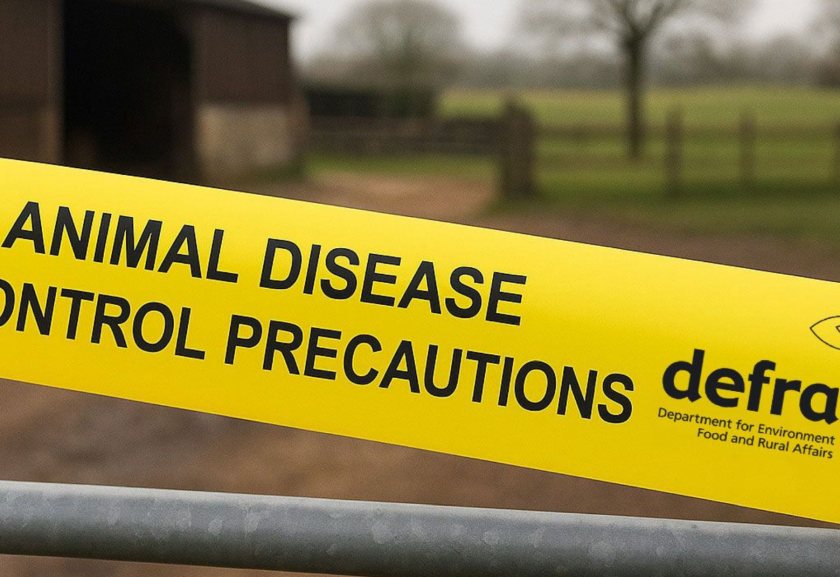Defra orders regional poultry housing as bird flu threat intensifies

Farmers across northern and eastern England are being ordered to bring their flocks indoors as Defra imposes a mandatory housing order to contain the fast-spreading threat of avian influenza from from 00:01 hrs on Thursday 30 October.
The emergency measure applies to large parts of England, including the North, Midlands and eastern counties, where infection risk is highest.
However, the absence of a similar order in southern England, Wales, Scotland and Northern Ireland has left many producers beyond the boundary questioning why restrictions stop short.
The high-risk zone extends from the Scottish and Welsh borders south to Knighton, sweeping across the Midlands north of Birmingham and Peterborough before looping around East Anglia down to Colchester and Harwich.
England last saw a regional housing order in December 2024, lifted in stages from May 2025, following months of outbreaks that affected multiple counties.
The affected counties and unitary authorities include Cheshire, Cumbria, Derbyshire, Durham, East Riding of Yorkshire, Greater Manchester, Lancashire, Leicestershire, Lincolnshire, Merseyside, Norfolk, North Yorkshire, Northumberland, Nottinghamshire, Rutland, Shropshire, South Yorkshire, Staffordshire, Suffolk, Tyne & Wear, and West Yorkshire.
The measures do not apply to hobby keepers, only to those with more than 50 birds, or keep farmers who sell or give away eggs or poultry products.
Defra said this was due to the increased biosecurity risk associated with trading activity, such as vehicle movements between sites. These keepers must therefore keep their birds housed to reduce exposure to infection.
UK Chief Veterinary Officer Christine Middlemiss said: “The risk of avian flu is seasonally very high which is why we are introducing these measures to help protect livelihoods and animal welfare.
“There is an increasing number of avian influenza cases on commercial farms and in backyard flocks across various counties across England. Prompt action to try and prevent the further spread of disease is now necessary and I would urge bird keepers to comply with the new housing measures."
Experts had been warning for weeks that the autumn migratory season would bring renewed pressure on poultry farms.
Speaking in September, Gordon Hickman, Defra's head of exotic disease policy, told a seminar audience that authorities were “planning for another difficult autumn and winter”, adding that it was “going to be worse than the last 12-month period, and certainly a lot worse than the six [cases] that we had the previous year.”
That warning has proven prescient. Since the start of the administrative year on 1 October, outbreaks have accelerated, including one affecting a 300,000-bird barn unit and four commercial free-range layer farms — together accounting for more than half a million hens lost so far this season.
With ten confirmed cases across the UK, this has already become the worst October since 2021, when the industry lost over one million birds from outdoor systems.
The continuing spread has prompted concern within retail supply chains, with reports that supermarkets are asking suppliers to prepare contingency plans for egg shortages.
The British Free Range Egg Producers Association (BFREPA) has welcomed Defra's swift decision to impose a regional housing order, calling it a “necessary and decisive” response to the escalating threat.
But the organisation expressed disappointment that the policy has not been extended nationwide. It argues that a GB-wide housing order would provide stronger protection for flocks and consistency for producers facing similar risks across the UK.
BFREPA’s Head of Strategy and Producer Engagement, Gary Ford, said: “We welcome Defra's decision to take decisive action in areas most affected by avian influenza. However, this remains a really testing and extremely worrying time for free range egg producers across the whole of the UK.
“A consistent, UK-wide housing order would not only offer stronger protection for free range birds but also provide clarity and fairness for farmers, wherever they are based.
"Producers are all facing similar risks, and a joined-up approach would give the sector much-needed reassurance and confidence at an extremely difficult time, and so early in the bird flu season.”
While Wales, Scotland and Northern Ireland continue to determine their own approaches, BFREPA is urging devolved governments to work closely with DEFRA to deliver a coherent, UK-wide strategy.
The association said it would keep supporting members with practical guidance, regular updates and engagement with officials to safeguard bird welfare and farm resilience throughout the housing period.
“The welfare of our flocks — and the livelihoods and mental wellbeing of those who care for them — remain our top priority,” BFREPA said.








